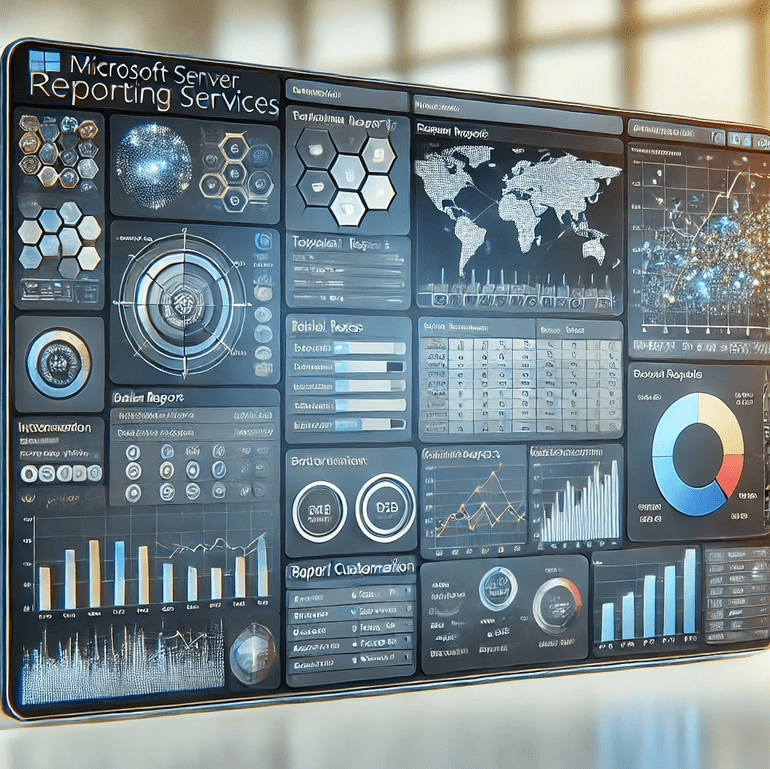In today’s data-driven world, having the right tools to access, analyze, and share business insights is critical. For organizations looking to leverage their data, Microsoft SQL Server Reporting Services (SSRS) offers a comprehensive solution for creating, managing, and delivering reports that provide actionable intelligence. Whether it’s real-time dashboards for executives or detailed operational reports for department heads, SSRS enables businesses to convert raw data into meaningful insights. At Curate Consulting Services, we understand that implementing and maximizing the use of SSRS requires both technical expertise and strategic alignment. Our specialized talent acquisition services ensure that your business has the right professionals in place to harness SSRS effectively.
What is Microsoft SSRS?
SQL Server Reporting Services (SSRS) is a robust, server-based reporting platform developed by Microsoft, designed to meet the reporting needs of businesses across industries. As part of the Microsoft SQL Server suite, SSRS integrates seamlessly with SQL Server databases and other data platforms, allowing users to design, create, and distribute reports across their organizations.
SSRS is not just a reporting tool; it’s a full-fledged business intelligence (BI) solution. Its versatility spans a variety of industries, including healthcare, finance, retail, and manufacturing, where real-time reporting, detailed analytics, and decision-making insights are essential.
Key Features of SSRS
SSRS offers a rich set of features that cater to both novice users and advanced report developers, providing organizations with the flexibility to meet diverse reporting needs.
1. Report Authoring and Design
SSRS allows users to create reports using SQL Server Data Tools (SSDT), previously known as Business Intelligence Development Studio (BIDS). This integrated development environment (IDE) enables the design of pixel-perfect reports with great flexibility. Whether you’re creating tabular, matrix, or free-form reports, SSRS supports a variety of report styles. The Report Definition Language (RDL) forms the backbone of report authoring, offering both simplicity and customization for report developers.
This authoring flexibility makes SSRS ideal for organizations that need highly customizable reports tailored to their specific business needs.
2. Connecting to Diverse Data Sources
SSRS provides the capability to connect to a wide range of data sources, including SQL Server, Oracle, ODBC, OLE DB, XML, and custom data sources. It also supports data retrieval through SQL queries, stored procedures, and views, giving users the power to tap into various data repositories.
Organizations benefit from this diversity of data sources, as it allows for comprehensive data integration across different systems, helping businesses consolidate data from multiple touchpoints.
3. Dynamic Data Sets and Parameters
Reports in SSRS are powered by data sets, which retrieve data from these sources. These data sets can be parameterized, allowing users to generate dynamic, interactive reports. By using report parameters, users can filter, customize, and interact with the report’s content. This functionality enhances the user experience by tailoring reports based on specific input, whether it’s a time range, product category, or regional sales data.
This level of interaction empowers decision-makers by providing them with the exact insights they need at any given time.
4. Rich Report Rendering Options
One of the key strengths of SSRS is its ability to render reports in multiple formats, including PDF, Excel, Word, HTML, XML, CSV, and more. This flexibility allows businesses to share reports in the format that best suits their needs—whether it’s a detailed Excel file for data analysis or a well-designed PDF for stakeholder presentations.
With so many rendering options, SSRS ensures that data can be delivered in the most accessible and consumable format for your audience.
5. Interactive and Drill-Down Reports
SSRS goes beyond static reporting by offering features such as drill-down and drill-through reports. These interactive reports allow users to explore data hierarchies and navigate through different levels of detail. For instance, a high-level sales report can be drilled down to view data for specific products, regions, or time periods.
This interactivity enhances the user experience and provides deeper insights into the underlying data, helping organizations make informed, data-driven decisions.
6. Report Scheduling and Delivery
One of the standout features of SSRS is its ability to schedule reports for automatic generation and delivery. Reports can be sent to various destinations, including email, file shares, and SharePoint libraries. This ensures that the right reports reach the right stakeholders at the right time, without requiring manual intervention.
With SSRS, businesses can automate their reporting processes, freeing up valuable time and ensuring that critical insights are always available when needed.
7. Security and Report Subscriptions
Security is paramount in SSRS, with role-based security ensuring that users only have access to the reports and data they are authorized to view. SSRS also integrates with Windows Authentication for streamlined access management. Additionally, report subscriptions allow users to subscribe to specific reports and receive them at scheduled intervals, personalized to each recipient’s needs.
This combination of security and convenience makes SSRS a trusted solution for organizations with strict data governance and compliance requirements.
8. Report Versioning, Caching, and History
SSRS supports report versioning and history, enabling organizations to track changes over time and revert to previous versions if needed. Furthermore, reports can be cached to improve performance, especially for frequently accessed reports. This reduces the load on the underlying database, ensuring faster report delivery and a better user experience.
9. Custom Branding and Extensibility
The SSRS web portal is customizable, allowing organizations to align the look and feel of their reporting interface with their corporate branding. Additionally, SSRS is highly extensible through custom code, assemblies, and data extensions, enabling organizations to integrate it with other tools and data sources.
This flexibility ensures that SSRS can evolve alongside an organization’s reporting needs and brand identity.
How Curate Consulting Services Can Help You Maximize SSRS
While SSRS offers a comprehensive suite of features, implementing it effectively requires skilled professionals who understand both the technical aspects and business objectives of reporting. That’s where Curate Consulting Services comes in.
1. Specialized Talent Acquisition
At Curate Consulting, we understand that the success of your reporting and business intelligence initiatives depends on having the right people in place. Our specialized talent acquisition services help organizations identify and recruit professionals skilled in SQL Server, SSRS, and data reporting. Whether you need an SSRS developer to customize reports or a business intelligence analyst to interpret the data, we have access to the talent you need.
2. Tailored Consulting Solutions
Beyond staffing, we provide tailored consulting services that help businesses implement and optimize SSRS. Our consultants can guide you through everything from initial deployment to custom report development, ensuring that your reporting environment aligns with your strategic goals. We focus on delivering solutions that maximize the value of your data, helping you make better decisions faster.
3. Training and Upskilling Your Team
For organizations that want to upskill their existing workforce, Curate Consulting offers training programs designed to help your team master SSRS and other business intelligence tools. By investing in your team’s capabilities, you can unlock the full potential of your data and reporting platform.
Why Choose Curate Consulting Services?
With over two decades of experience in business transformation, data analytics, and IT consulting, Curate Consulting Services is uniquely positioned to help organizations of all sizes leverage the power of SSRS. Our deep expertise in data reporting, combined with our extensive network of technical talent, ensures that you get the support you need to thrive in a data-driven environment.
We pride ourselves on delivering solutions that are tailored to each client’s unique needs, whether it’s through staffing, consulting, or training. When you partner with Curate Consulting Services, you’re not just getting a service provider—you’re gaining a strategic partner dedicated to your long-term success.
Conclusion: Elevate Your Reporting with Microsoft SSRS and Curate Consulting
Microsoft SSRS is an indispensable tool for organizations looking to transform their data into actionable insights. From customizable reports and automated scheduling to interactive dashboards and security features, SSRS empowers businesses to make smarter, data-driven decisions.



